Registration is now open for our upcoming Meaning Conference this summer (July 30 – Aug 2). Find early bird discounts here: https://www.meaning.ca/conferences-and-events/meaning-conference-2020/ Full conference info here: www.meaning.ca/conference
For a number of reasons, many people dislike responsibility because they feel that it means external imposition on their personal freedom or it blames the victims for their problems. There is some truth in their concerns.
But I invite you to consider the possibility that when properly understood, responsibility is actually the best antidote to the unprecedented existential crisis confronting humanity, such as covid-19 cases, climate change, or the scandals and corruptions in Washington. Without personal and social responsibility, Western democracy may not survive in the clash of civilizations.
I also want you to consider the proposition that Responsibility = Resilience + Meaning + Wellbeing. It is not possible for anyone to achieve positive mental health or realize their dreams without taking personal responsibility seriously.
What is the best way to travel from where you are to where you want to be?
If you want to complete your life’s journey without any major mishap or shipwreck, you need to take responsibility seriously, Without it, you cannot solve any of life’s problems and you will become vulnerable to mental illnesses (Peck, 1978/2012). Furthermore, responsibility also offers you the best protection against self-destruction, nihilism, and authoritarian ideology (Fromm, 1941; Peterson, 2018).
From a positive perspective, responsibility frees you from all the destructive forces so that you can be free to pursue what is good and noble. If you want to become your best and flourish, you should consider responsibility as the key to unlocking all your potentials and fulfill all your dreams (Wong, 2011). That is why in all my research and clinical practice emphasize responsibility as an essential component of meaning (Wong, 2012; Wong & Fry, 1998). Other influential public psychologists who also equate meaning with responsibility include Viktor Frankl (1985), Scott Peck (1978/2012), and Jordan Peterson (2018). For those unfamiliar with Peterson’s work, see my assessment of Peterson regarding responsibility (Wong, 2019a).
Responsibility As a Master Virtue
Recently, as my focus shifted from meaning to the role of responsibility in resilience, positive mental health, and public health (Wong, 2019b), I propose that responsibility is the master virtue and the key to our survival and flourishing (Wong, 2019c, 2020; Ellin, 2019; KPJR Films, 2019; Craig, 2019).
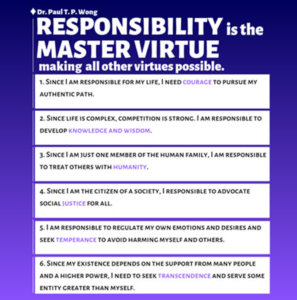
Unfortunately, my high view of responsibility has not widely accepted by the positive psychology community, especially the meaning researchers, who do not consider responsibility as a constituent of meaning (e.g, Martela & Steger, 2016).
In my debate with Martin Seligman, he stated that responsibility does not even qualify as a signature strength, while I argued that responsibility, like courage, is a key virtue that make other character strengths and virtues possible. I hope that the following level of responsibility analysis will settle this debate and prove that both of us are correct. The full power of responsibility can be realized only when one can practice it as all three levels.
I believe that Greek philosophers, from Cicero to Aristotle, all considered responsibility as important for character development, human flourishing, and good government. Likewise, Chinese philosophers from Lao Tzu to Confucius put similar emphasis on personal and social responsibility as essential for the good life.
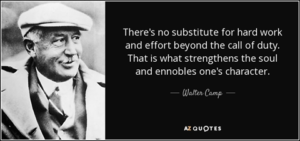
The Three Levels Of Responsibility
Level One
As a practical and moral necessity or obligation for any human being – it is something I MUST do in order to survive as a law-abiding citizen in a civilized society. For example, as an employee in a company, I must do my job as required by my contract. Parents have moral and legal obligation to look after the wellbeing of their children.
At this level, it is expected of all adults with a sound mind to solve their personal problems, control their emotions, and take care of their health. There is nothing worthy of praise at this level because one simply meets the basic legal/ethical duties as required in any civilised society.
Level Two
As a desirable civil engagement for a good citizen – it is something I OUGHT to do for the common good of my country. As a good citizen, I hold myself accountable to obey the law even when no one is watching and do what is good for my country, such as voting, donating to charities, doing some volunteer work, and helping neighbours in need.
At this level, I want to function as a dependable and ethical agent and a productive member in order to keep our society proper. However, there is nothing meritorious or virtuous about simply doing what is expected of all decent human beings in a civilized society. We simply owe it to others as being part of the implicit social contract.
Level Three
As an ideal to be a fully functioning authentic person – it is something I ASPIRE to do in order to become my best and accomplish my unique mission in life for the betterment of humanity.
At the highest level, I will go beyond the call of duty, beyond normative expectations of my society, to strive towards excellence, and achieve a noble dream. All the celebrated social reformers from Martin Luther King Junior to Nelson Mandela are individuals who felt responsible for the human rights and wellbeing of their oppressed people.
Level 3 responsibility also means the responsible use of freedom. It means making the best use of my time and talents to achieve excellence and fulfill my dream. It requires extraordinary efforts, commitment, and self-sacrifice each and everyday,
Without this aspirational sense of mission, one will not be able to practice one’s character strengths every day or advance what is good and noble. Without this level of responsibility, one will not achieve excellence according to Aristotle.
This is what Viktor Frankl called the responsible use of freedom, no matter how limited our choices or how difficult it is. This is what I call the master virtue, because without it, one cannot develop other virtues.
For the above reasons, responsibility is an essential condition of the resilient mind.

Here is the Responsibility Scale I developed with Gökmen Arslan that emphasizes level 3 responsibility:
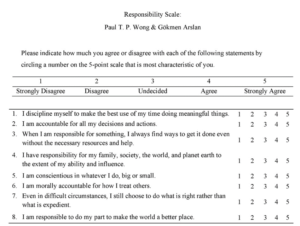
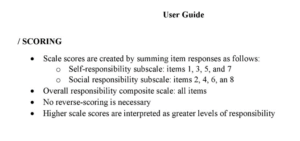
Conclusion
In sum, our greatest need in turbulent times is responsibility (Wong, 2019c). We cannot function fully as individuals without taking responsibility seriously. Our democratic system will not function either, if the government and citizens do not fulfill their respective roles of responsibility.
Only I, and I alone am responsible to work on my piece of land and make it flourish, no matter how poor the quality of the soil. Only I, and I alone am responsible to fulfill my calling; no one else can do it for me.
Therefore, I set my eye on my noble life goal, and do my utmost to improve myself and strive towards it, regardless of the cost, because I believe that I have the responsibility to become what I was meant to be. I have the awesome responsibility to become my best in order to give my best to humanity.
That is why responsibility is a virtue only at the aspirational and inspirational level. We need to cultivate responsibility within all the major domains of society, such as our education, family, and workplace (Wong, Ivtzan, & Lomas, 2016).
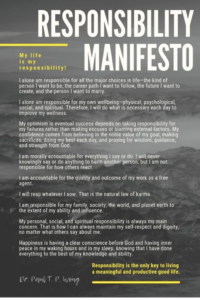
References
- Craig, H. (2019). Resilience in the Workplace: How to be more resilient at work. com. Retrieved from https://positivepsychology.com/resilience-in-the-workplace
- Ellin, A. (2019). Everyday Health Special Report: Why 2019 is the Year of Resilience. Everyday Health. Retrieved from https://www.everydayhealth.com/wellness/state-of-resilience /
- Frankl, V. E. (1985). Man’s search for meaning. New York, NY: Washington Square Press.
- Fromm, E. (1941). Escape from Freedom. New York, NY: Farrar & Rinehart.
- KPJR Films. (2019). The Facilitator’s Guide to Resilience: A discussion guide to accompany screenings of the documentary film. Prevent Child Abuse America. Retrieved from https://preventchildabuse.org/wp-content/uploads/2019/02/Resilience_Guide_FINAL_UPDATED_020119.pdf
- Martela, F., & Steger, M. F. (2016). The three meanings of meaning in life: Distinguishing coherence, purpose, and significance. Journal of Positive Psychology, 11(5), 531-545. http://www.ippanetwork.org/wp-content/uploads/2017/02/Martela-Steger-JOPP.pdfI
- Peck, M. S. (1978/2012). The Road Less Travelled. London: Rider.
- Peterson, J. B. (2018). 12 Rules for Life: An antidote to chaos. Toronto, ON: Vintage Canada.
- Wong, P. T. P. (2011). The meaningful living project. International Network on Personal Meaning. Retrieved from http://www.meaning.ca/archives/archive/art-meanignful-living-project-p-wong.html
- Wong, P. T. P. (2012). Toward a dual-systems model of what makes life worth living. In P. T. P. Wong (Ed.), The human quest for meaning: Theories, research, and applications (2nd ed., pp. 3-22). New York, NY: Routledge.
- Wong, P. T. P. (2019a). Assessing Jordan B. Peterson’s contribution to the psychology of well-being: A book review of 12 Rules of Life. International Journal of Wellbeing, 9(1), 83-102. https://doi.org/10.5502/ijw.v9i1.829
- Wong, P. T. P. (2019b). How I cracked nature’s code for positive mental health: Introduction and my search for meaning. Positive Living Newsletter. . Retrieved from https://www.meaning.ca/article/how-i-cracked-natures-code-for-positive-mental-health-introduction-and-my-search-for-meaning/
- Wong, P. T. P. (2019c). Responsibility as the antidote to the chaos in our society in dangerous times. Positive Living Newsletter. Retrieved from https://www.meaning.ca/article/what-is-the-greatest-need-today/
- Wong, P. T. P. (2020). New Year’s Resolutions: Four Proven Ways to Make Them Stick. Positive Living Newsletter. Retrieved from https://www.meaning.ca/article/new-years-resolutions/
- Wong, P. T. P., & Fry, P. S. (Eds.). (1998). The human quest for meaning: A handbook of psychological research and clinical applications. Mahwah, NJ: Erlbaum.
Wong, P. T. P., Ivtzan, I., & Lomas, T. (2016). Good work: A meaning-centred approach. In L. G. Oades, M. F. Steger, A. Delle Fave, & J. Passmore (Eds.), The Wiley Blackwell handbook of the psychology of positivity and strengths-based approaches at work (pp. 233-247). West Sussex, UK: Wiley Blackwell.
Cite
Wong, P. T. P. (2020, March 3). Why is Responsibility Essential For Resilience And Positive Mental Health? A Level-of-Commitment Analysis. Dr. Paul T. P. Wong. Retrieved from drpaulwong.com/why-is-responsibility-essential-for-resilience-and-positive-mental-health-a-level-of-commitment-analysis/

 Meaning Conference 2025 will be the INPM’s first in-person conference with a virtual option after the pandemic.
Meaning Conference 2025 will be the INPM’s first in-person conference with a virtual option after the pandemic.